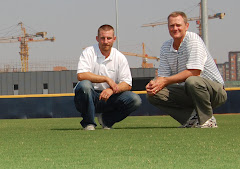 A low mowing height makes for a very dense and uniform turfgrass stand, but it adds another stress to an already stressed plant, making management this time of year even more difficult.
A low mowing height makes for a very dense and uniform turfgrass stand, but it adds another stress to an already stressed plant, making management this time of year even more difficult.As Mother Nature dries out the surrounding landscape, we're battling to keep the grass green and disease-free. The Olympic Games require the turf to be mowed at a very short height, which makes keeping the grass healthy and green during these extreme temperatures even more difficult. A short mowing height gives the athletes a very dense and uniform turfgrass surface. With these extreme temperatures, it's important to irrigate to keep the grass healthy, but too much water creates the ideal conditions for diseases to develop. So we have to make our irrigation light and as uniform as possible.

Frequent, light and uniform irrigation is needed to stop the grass from going into summer dormancy, but too much water increases the potential for diseases to develop.
 Fungicides must be regularly applied to prevent this cool-season grass from being overtaken by disease in the hot and humid Chinese climate.
Fungicides must be regularly applied to prevent this cool-season grass from being overtaken by disease in the hot and humid Chinese climate.Olympic fever is sweeping across Beijing. Decorations, billboards and signs with Olympic rings, athletes and symbols are popping up everywhere -- sometimes overnight. Subway stops and street corners are now home to Olympic volunteers eager to direct tourists. Security across the city is tightening; subway gates are now equipped with x-ray equipment and metal detectors. The number of people using the subway and bus systems has gone up dramatically because of a temporary traffic law designed to improve air quality for the Olympic games. The law says that drivers with even license plate numbers can drive only on even days and drivers with odd license plate numbers can drive only on odd days. We're wondering how this will be enforced in a area with a population of 17 million people. I'm leaving these problems to the police and focusing on the grass.
-- Alec Kowalewski


